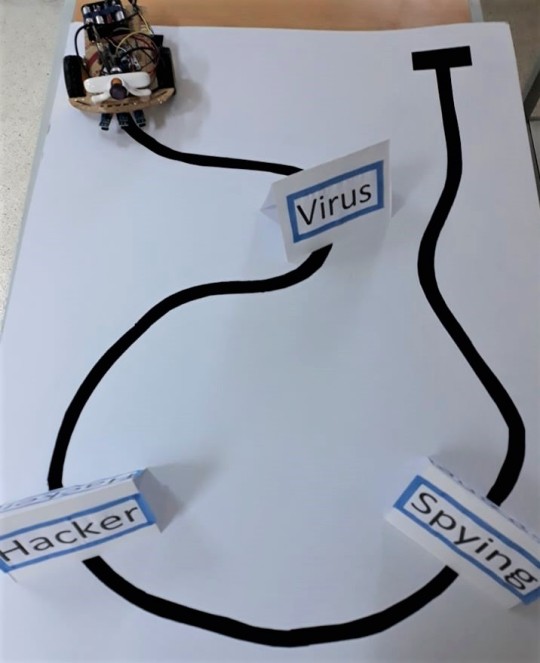Practising proper netiquette with micro:bit
Publication date: July 9, 2020
by Imen Taktak Marzouk, EU Code Week Ambassador in Tunisia
Digital technologies provide us with a world of possibilities at our fingertips. Never before have we enjoyed so many opportunities to learn, exchange, participate and create.
Yet, the Internet also opens up certain risks to its users – especially the most vulnerable ones, like children. Privacy concerns, cyberbullying, disinformation, exposure to potentially harmful content and predatory behaviours are just a few of these.

To teach students about these risks and eventually prevent them, we designed a STEM activity with the slogan “Together to have a better Internet” using the microcontroller micro:bit.
We coded a robot with three sensors for line following and one sensor for avoiding obstacles. Naturally, we chose the obstacles according to the slogan. When the robot detects a barrier on its way, which we called VIRUS, HACKER or SPYING, it stops moving and makes a sound. Once the students remove the block from the path of the robot, it continues following the line we had pre-designed.
Our students implemented the activity in two steps:
#1 Preparing the model of our robot
#2 Coding the path and functions of the robot, using the micro.bit simulator

To disseminate our work, we participated in a video conference organised by the ministry of education in Tunisia and our eTwinning Partner Support Agency. The conference was held to support the EU initiative “Safer Internet Day 2020”, which takes place annually on 11 February. Teachers and students presented their activities and demonstrated their responsible use of the Internet and awareness of Internet dangers.
Coding is a fundamental skill in the digital age. Therefore, we designed this activity to help students understand coding and adopting it as their skill. Learning how to code at a young age prepares them for the future. Coding helps children in various other fields like communication, creativity, writing and STEM, without letting them forget the importance of practising proper netiquette.

